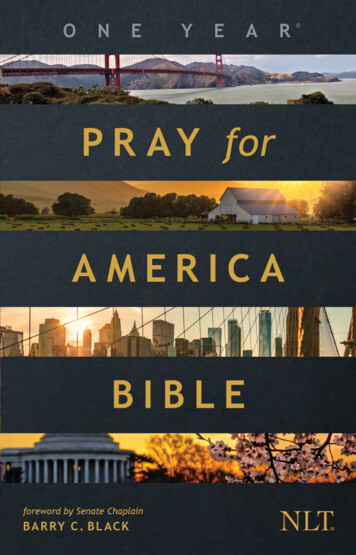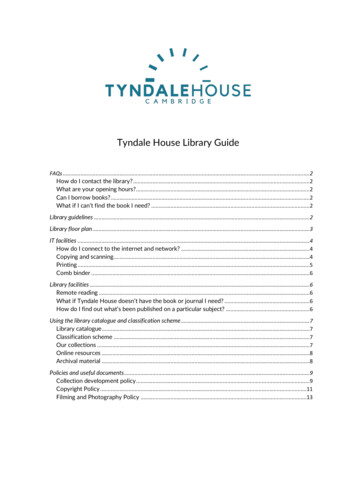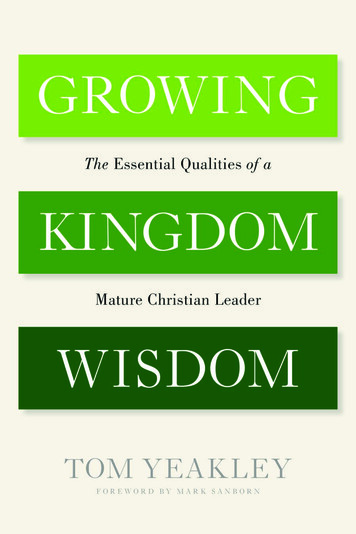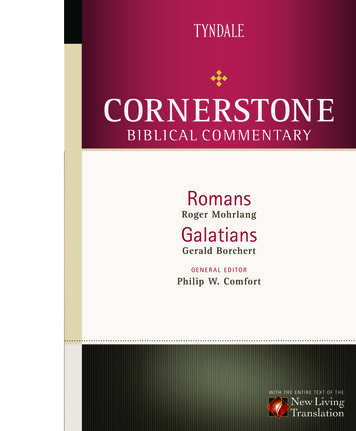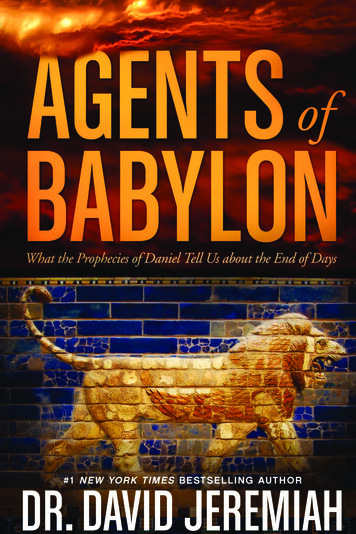
Transcription
AGENTS ofBABYLONWhat the Prophecies of Daniel Tell Us about the End of DaysDR. DAVID JEREMIAHTyndale House Publishers, Inc.Carol Stream, Illinois
Visit Tyndale online at www.tyndale.com.TYNDALE and Tyndale’s quill logo are registered trademarks of Tyndale House Publishers, Inc.Agents of Babylon: What the Prophecies of Daniel Tell Us about the End of DaysCopyright 2015 by David Jeremiah. All rights reserved.Cover photographs are the property of their respective copyright holders and all rights are reserved:sky SJ Allen/Shutterstock; storm Minerva Studio/Dollar Photo Club; Ishtar gate and façadeby Marcus Cyron, used under Creative Commons Attribution license; lion by Maria Giulia Tolotti,used under Creative Commons Attribution license.Author photograph taken by Alan Weissman, copyright 2011. All rights reserved.Designed by Jennifer GhionzoliEdited by Stephanie RischePublished in association with Yates & Yates (www.yates2.com).All Scripture quotations, unless otherwise indicated, are taken from the New King James Version, copyright 1982 by Thomas Nelson, Inc. Used by permission. All rights reserved.Scripture quotations marked NLT are taken from the Holy Bible, New Living Translation, copyright 1996, 2004, 2015 by Tyndale House Foundation. Used by permission of Tyndale HousePublishers, Inc., Carol Stream, Illinois 60188. All rights reserved.Scripture quotations marked ESV are taken from The Holy Bible, English Standard Version (ESV ), copyright 2001 by Crossway, a publishing ministry of Good News Publishers. Used bypermission. All rights reserved.Scripture quotations marked GNT are taken from the Good News Translation in Today’s EnglishVersion, Second Edition, copyright 1992 by American Bible Society. Used by permission.Library of Congress Cataloging- in- Publication DataJeremiah, David, date.Agents of Babylon : what the prophecies of Daniel tell us about the end of days / Dr. DavidJeremiah.pages cmIncludes bibliographical references.ISBN 978-1-4143-8052-0 (hc)1. Bible. Daniel—Prophecies. 2. Bible. Daniel—Criticism, interpretation, etc. I. Title.BS1556.J465 2015224'.5015—dc23 2015026384Printed in the United States of AmericaISBN 978-1-4964-1123-5 (International Trade Paper Edition)217206195184173162151
CONTENTSIntroduction: Whya Book about Babylon? viiChapter 1The Hostage 1Chapter 2The Insomniac 29Chapter 3The Colossus 55Chapter 4The Fire Men 83Chapter 5The Wolf- Man 109Chapter 6The Fingers of God 137Chapter 7The Lion King 167Chapter 8The Conqueror 195Chapter 9The Madman 223Chapter 10The Herald 251Chapter 11The Archangel 281Chapter 12The End 309Epilogue: Marching toward the Beginning 335Appendix: The AgentAcknowledgmentsof Agents 341351Notes 355About the Author361
IntroductionWHY A BOOKABOUT BABYLON?In 1859, Charles Dickens w rote his famous novel A Tale of TwoCities, which was set in late eighteenth- century Paris and London.This was the time of the French Revolution, when the streets of Parisran with blood spilled in the country’s reign of terror.The Bible could also be termed a tale of two cities: Jerusalemand Babylon. Jerusalem, of course, is the historical capital of God’schosen nation, Israel, and the future capital of His eternal Kingdom.Babylon, on the other hand, is the city the Bible uses as a recurringsymbol for the world’s e vils— decadence, cruelty, abuse of power, andespecially rebellion against God.Babylon began as Babel, the city established by the ambitiousNimrod in his attempt to organize the first worldwide governmentin opposition to God (Genesis 11:1-9). Centuries later, it was thearmies of Babylon that conquered Jerusalem and the city of Babylonthat held the exiled Jews captive.v ii
AGENTS OF BABYLONBabylon fell more than five centuries before Christ, but its spiritsurvived in subsequent world empires, including Rome, the society thatexecuted Christ and persecuted the first Christians. Despite its strength,the Roman Empire eventually fell. We know from biblical prophecy,however, that it will revive in the end times. But as Revelation makesclear, its spirit will be that of Babylon, because it will continue whatNimrod began— humankind’s attempt to usurp the authority of God.The other city, Jerusalem, has fallen several times and has beenoccupied or oppressed throughout much of history. It might seem,therefore, that Babylon, the city of man, has been stronger thanJerusalem, the city of God. But that’s not the case. Yes, Jerusalemhas been persecuted, but for a good reason: its persecution has been aform of discipline designed to prepare it for its future role. The book istory- long struggle betweenof Revelation makes it clear that in the hthese two cities, Jerusalem will be the ultimate victor. Revelation tellsof Babylon’s final destruction and the ascendancy of Jerusalem as thepermanent capital of God’s eternal Kingdom.The natural question, then, is why I would choose to write a bookabout an evil city that will eventually suffer an eternally crushingdefeat. The answer is that we are living in a time marked by the spiritof Babylon, and we know from biblical prophecy that this force willcontinue to rise until it dominates the entire world. I wrote this bookto help us prepare for that time, which I am convinced is close at hand.* * *BABYLON FROM THE INSIDENowhere in the Bible do we get a clearer picture of the nature ofBabylon than in the book of Daniel. The book bears the name of itsauthor, one of the prominent exiles forced to march to Babylon whenKing Nebuchadnezzar conquered Jerusalem almost six centuriesv iii
Why a Book about Babylon?before Christ. A study of Daniel is relevant because it portrays aperiod of history that is much like the culture we find ourselves intoday. The first half of the book gives us a picture of the kind ofpeople we must be to remain strong in the face of the future Godreveals in the last half of the book.I have chosen to focus this study of the book of Daniel on the personality portraits it presents to us. These are the “agents” of Babylon.In Daniel we meet two kinds of human agents. First, we see peopleof prayer and firm conviction who know who God is and refuse tocompromise their faith by giving in to the demands of a corruptand godless culture. Second, we see people who are filled with pride,given to debauchery, and have no respect for any god but their ownglory and appetites. Most important, we meet the Agent of a gents— the Most High God, who exercises His sovereign control at everytwist and turn of the story.As we encounter these agents, we will explore the prophetic visionsdescribed in the book of Daniel. These visions show us two futures.The first is a future that had not yet occurred when Daniel wrote ofit but has now been explicitly fulfilled in history. It’s the story of fourworld empires that have risen and fallen exactly as Daniel predicted.The second future is one that is yet to come— a dark and forebodingfuture describing what we call the end times, which will occur beforethe glory of Christ fills the world forever. The explicit accuracy ofthe prophecies that have been fulfilled gives us absolute confidencein those that are yet to be fulfilled.Both of these phases of Daniel’s prophecy have immense valueto us today. They bring to light the cyclical nature of history andproject it into the future to show us how we must live in the present so we can prepare for the time yet to come. In fact, the entire aniel— both the personal portraits and the p rophecies— book of D demonstrates why the courage, conviction, and devotion to prayerportrayed by Daniel are as critical today as they were in his time.ix
AGENTS OF BABYLONDaniel himself lived in a time of rampant godlessness in an empirethat wallowed in opulence, debauchery, arrogance, blasphemy, and pleasure— an empire that brought devastation to God’s people.Those with the discernment to read the signs of the times today(Matthew 16:2-3) recognize that the similarities between Daniel’sBabylon and today’s Western culture are signs that Daniel’s dark prophetic visions loom close on the horizon. The only way to endureis to rely on God’s strength, as Daniel did, and commit ourselves tostanding up for principles of righteousness.Years ago, Francis Schaeffer, concerned about the increasing godlessness of Western culture, wrote a book titled How Should We ThenLive? That question can be answered vividly with the examples ofcourage and conviction in the book of Daniel.Good men such as Daniel and his three godly associates didn’tprevent the fall of Babylon. That wasn’t their purpose. But they didprevent their own fall into compromise that would have swept theminto perdition along with Babylon. Standing up for their faith wasn’teasy. It took enormous courage, conviction, faith, endurance, andprayer. That’s what it will take today for us to remain faithful to ourGod in an increasingly godless generation that is bent on followingthe way of Babylon into destruction.* * *THE STRUCTURE OF THIS BOOKIn my previous book Agents of the Apocalypse, I opened each chapterwith a fictional narrative about the subject of the chapter and endedwith an exposition of the Scripture behind the story. That structure seemed to help people engage with and understand the bookof Revelation in a new way, so I decided to repeat the approach inthis book.x
Why a Book about Babylon?If you have not read Agents of the Apocalypse, let me explain myrationale for this approach. The fictional section of each chapter isdesigned to whet the reader’s appetite for scriptural truth by showingthe drama and excitement inherent in biblical narratives. The secondsection is designed to separate fact from fiction and make relevantapplications to our lives. To put it another way, the fiction drives thetruth into our hearts, and the Scripture behind the fiction drives itinto our minds. My prayer is that this book will accomplish both ofthese objectives in your life.Dr. David JeremiahFall 2015xi
Chapter 1THE HOSTAGEDaniel 1:1-21The young man— hardly more than a boy— no longer bothered tobrush away the flies that buzzed around his face. His tunic of finelinen was now caked with dust and sodden with sweat. The once- sturdy soles of his sandals, crafted by the finest cobbler in Jerusalem,were worn so thin that his feet were purple with bruises from treadingthe stones on the long, dry road.He was dead tired, hardly able to lift a foot to take another step.Yet he and his companions kept walking, as they had every day forthe past four weeks, beginning at dawn and not stopping until sunset. His only relief came when it was time to eat the meager rationof dried bread and drink the tepid water his captors provided. But itwasn’t long before the hostages were prodded to get moving again,herded down the seven- hundred- mile road to Babylon.The young man’s name was Daniel. He was fourteen years old,tall and well built before the march reduced his muscular limbs toskin and bone. As miserable as the conditions were, he hardly noticed1
AGENTS OF BABYLONthe flies, the bruises, the blistering heat, or even the mind- numbingexhaustion. Those challenges paled next to the horrors he’d witnessedbefore the march— images that were now seared into his feveredbrain. The pounding of Babylonian battering rams against the wallsof Jerusalem. The stream of Babylonian soldiers pouring into the city.The screams of panicked citizens as they raced through the streets.The Babylonians in their chariots, striking down men, women, andchildren. Worst of all, his final glimpse of his parents as they werebrutally slaughtered before his eyes.He groaned inwardly as he remembered his beloved Leah, thebeautiful girl he was betrothed to, being wrenched from his arms anddragged away screaming. When he fought to free her, a Babyloniansoldier knocked him unconscious and threw him onto a cart withother wounded Jews.Daniel shuddered as he remembered the sickening feeling thatcame over him when he awakened in the cart. Everywhere he looked,the streets of Jerusalem were strewn with bloodied bodies. His tearsflowed when he recalled passing the Temple and seeing enemy soldiers piling the sacred worship utensils onto wagons to be hauledaway to Babylon. He remembered his shock as the cart carried himthrough the Eastern Gate, where he joined the other Jews who hadbeen selected to march to Babylon. He looked around and noticedthat all of them were young. Those who were old or middle aged orill had been slaughtered or left in the city.These images haunted Daniel’s mind every waking hour as hemade the grueling march, and they ravaged his sleep every night.Someone behind Daniel spoke, pulling him out of his painfulmemories and back to the miserable present.“I think I know you,” the voice said.Daniel turned and looked into the first familiar face he’d seen onthe road to Babylon. “Hananiah!” The words cracked through hisdry throat. “You survived.”2
The Hostage“Yes, but I’m not convinced that’s such a blessing. The dead onesmay be better off than we are. Have you seen our friends Mishaeland Azariah?”“No,” Daniel replied. “Have you seen Leah? She and I were takenat the same time, but I don’t know whether she—”The searing pain of a whip shot across his back.“No talking!” a soldier bellowed. “You know the rules. Speakagain, and it’s ten lashes for both of you.”The relentless march continued for weeks. Many Jews died alongthe way, their bodies left by the roadside for the vultures. The firsthole appeared in Daniel’s sandal, and the stones of the road beganto cut through his skin. The more raw his foot became, the more hestruggled to keep pace. More than once he stumbled and fell, buteach time he managed to get up and continue walking. He was growing delirious, no longer fully conscious of his surroundings. Yet hisbody kept staggering forward.One day he was vaguely aware of a fellow journeyer saying hecould see the walls of Babylon. Within hours, they passed throughthe gate of the city. The march came to a halt, and Daniel, more deadthan alive, collapsed to the ground, unconscious.* * *Daniel awoke in a darkened prison cell crowded with other youngmen from his hometown, including Hananiah. He looked aroundand spotted his missing friends, Mishael and Azariah. His body wasraging with a fever, and when he tried to move, he was seized bya searing pain. For the next few days, he wandered in and out ofconsciousness. When the pain finally subsided and he became awareenough to realize its source, he groaned with an agony that wenteven deeper than the physical pain. He and his three friends hadbeen tragically mutilated. He would never be a husband. He wouldnever be a father.3
AGENTS OF BABYLONAs the prisoners healed, they were allowed to rest and were givenbread and water. A few weeks later, when the captives had regainedsufficient strength, their overseers began assigning them tasks. Someof the men were sent to clean stables and groom horses; others wereput to work as porters, carpenters, or janitors. Daniel was ordered tothe wagon yard to repair chariots and oxcarts.The female prisoners were also put to work, washing clothing,cooking, and mending garments. Some of the women served the menat lunchtime, brought weekly changes of clean clothing, and carrieddrinking water to them in the heat of the day.One day several weeks after he had begun his labor for theBabylonians, Daniel had just finished remounting a heavy wheelonto a wagon when he saw a young woman approaching with aflask of water. Her head was covered by a hood to protect her facefrom the sun, and Daniel, in his eagerness to drink, didn’t give hera second glance.When he lowered the flask and wiped his mouth, he caught aflash of recognition in the woman’s eyes.“Leah?” he exclaimed. “Is it you?”“Oh, Daniel,” she cried through joyful tears. “I’ve looked everywhere for you. I was afraid you’d been killed.”“I’m so glad you’re alive! I had no idea what they might have doneto you.”“We can’t keep talking.” She looked over her shoulder as shespoke. “They watch us at all times. Keep drinking while I tell youwhat I’ve learned.”Daniel again put the flask to his lips.“They are getting all the young women healthy again after themarch. Soon the most elite Jewish women will be pressed into the service of noblemen and officials, and the most beautiful will become theking’s concubines. The rest will be free to marry, though we will remainslaves. So there is still hope that you and I may have a life together.”4
The HostageDaniel stared hard at the dusty ground. “No, Leah, we have nofuture together. I am no longer the man I used to be. You must countme as dead and find another husband.” He handed the flask back toher and turned away to hide his tears.“But, Daniel—”“You there, water girl!” the voice of a guard boomed. “Cut thetalk and get on with your rounds.”Leah stifled a sob as she walked away. Daniel returned to the carts,his vision blurred by bitter tears.That night in his cell, Daniel writhed on the straw. He wouldnever know the joys of marriage. He would have no descendants. Hisname would be cut off forever in Israel, which for a Jew was almostworse than death. God, he prayed silently, what will fill this emptinessin my soul? Finally he fell into a fitful sleep.At dawn, however, Daniel arose calm and serene. He had receivedthe answer to his prayer. God Himself would fill the emptiness inhis life. God would be his friend, his purpose, and his comfort. Thatmorning in the darkness of his cell, Daniel made a solemn vow thathe would be faithful and true to God, just as he would have been to awife. He wouldn’t allow anything to come between him and his God.Bolstered by his newfound dedication to God, Daniel committedeach day to the Lord and to the task before him. His health returnedfully, and his body grew strong from the physical labor.One day as Daniel was replacing the damaged spokes of a chariotwheel, a guard approached and called him from his task.“You are wanted in the food galley,” the guard said. “Stop whatyou’re doing and report immediately.”A dozen other male slaves were making their way to the galley when Daniel arrived. More streamed in, until the room wasfilled with about thirty Jewish men. Among them were his friendsHananiah, Mishael, and Azariah.When everyone was assembled, two Babylonian men entered the5
AGENTS OF BABYLONroom and stood before them. The first was a m iddle- aged, d ark- skinned man dressed in the robes of a Babylonian official. The second, also finely dressed, stood slightly to the side, obviously an aideor assistant.The official stepped forward and addressed the gathering. “Myname is Ashpenaz. I am chief of the eunuchs in the palace of our greatking, Nebuchadnezzar— may he live forever. You have been selectedfrom among all the Jewish men as candidates for an exceptionalhonor. If you are chosen, you’ll be trained for the king’s service forthe next three years. You’ll learn the Babylonian language, literature,religion, philosophy, and astrology. You’ll be well cared for and fedwith the same food that is served at the king’s table, including thefinest meat that has been offered to the god Marduk.”Ashpenaz looked at the young men, pleased to see the hopereflected in their faces. “All of you were picked for your health,strength, and appearance. But before you are chosen, you mustmeet two additional qualifications: intelligence and discernment.To determine your fitness in these areas, I will interview each ofyou privately.”One by one, the young captives were ushered into Ashpenaz’spresence. Some returned quickly; others had lengthy interviews.Some came out crestfallen or angry, while others beamed with obvious pleasure. When it was Daniel’s turn, he was taken into the privatechamber, where Ashpenaz sat facing him.For the next hour, Daniel answered questions of almost everykind imaginable— political, religious, philosophical, scientific, andastrological. He solved riddles and mathematical equations. Heunraveled problems of logic, named the constellations, and identified the major classifications of animals. With each answer, Danielsensed Ashpenaz’s approval growing. After an hour or so, Ashpenazwas actually smiling, nodding his head in approbation, and commending Daniel for his astute answers.6
The Hostage“You are amazingly well educated for such a young man,” hesaid. “How do you feel about the prospect of serving in the court ofthe king?”“It would be a great honor, sir. But my commitment to my Godprevents it. I cannot, under the laws of my God, eat food sacrificedto an idol.”“Daniel, you must watch your tongue!” Ashpenaz said in a l oweredvoice. “Don’t call Marduk an idol in the royal palace. You could beput to death for such sacrilege, and it would be a terrible waste tolose you. Yet there’s no way I can allow you to eat any food other thanwhat the king orders. To disobey him would mean my own death.”“But, sir—”“Say no more, young man. This interview is over. You are chosenfor training, which means I must give you a Babylonian name.From this day forward, you are to be called Belteshazzar. Now go,Belteshazzar. Report to my steward, and he will escort you and theothers to the royal palace.”Eleven other young men were selected. The steward took them tothe palace complex, where they were given baths, groomed, dressedin Babylonian robes, and assigned plush rooms. Among the menselected were Daniel’s friends Hananiah, Mishael, and Azariah, whohad been given the Babylonian names Shadrach, Meshach, and Abed- Nego.At the call to the evening meal, Daniel walked with his friendsto the dining hall. “You know we are about to face a crisis, don’tyou? We will be served food that we cannot possibly eat with a clearconscience before God.”“What will happen when we refuse?” asked Shadrach.“We will be executed for disobeying the king’s order. I don’t knowwhat you will do, but I will not eat that food.”The others affirmed Daniel’s decision. “We will stand with you,”they vowed.7
AGENTS OF BABYLONThe four young men were seated at a table with the other eightcaptives. As they awaited the food, they introduced themselves.Eleazar, the man seated next to Daniel, had been given the Babylonianname Malik.Malik grinned broadly. “Men, our lives have suddenly taken aturn for the better. If we are careful, we can live out our years inluxury we never could have dreamed of in Jerusalem.”“But what about the food they will serve us?” Daniel asked. “Wecannot eat anything sacrificed to idols.”“Don’t you know that if we refuse, we will be executed?” Malikreplied. “Since God put us in this place, surely He expects us to eatwhat is set before us. What choice do we have? He will understandour dilemma and not hold it against us.”All the men except Daniel and his friends agreed with Malik.Daniel opened his mouth to respond, but just then the serversbrought the food. It was even more extravagant and abundant thanthey had imagined: fish, pheasant, pork, and aromatic meats cookedin rich sauces, plus an endless array of fruits, vegetables, cheeses,nuts, and pastries.The eight men did not restrain themselves— they plunged into thefeast with great enthusiasm. Daniel and his three friends, however,sat silently, their plates untouched and their heads bowed in prayer.When the meal was well underway, Ashpenaz’s steward came in tocheck on the diners. When he saw that Daniel and his friends had nottouched their food, he stormed over to them, his voice tinged withfury. “Why are you fools not eating? Are you trying to defy the king?”“No, sir, not at all,” Daniel replied. “We told your master that ourGod forbids us to eat food sacrificed to idols.”“Yes, yes, he told me that,” the steward barked. “But he didn’tbelieve you’d hold to it. He was sure that once the food was set beforeyou, you would relent.” He slammed a fist onto the table. “Now eat!If you disobey, it will mean your death.”8
The Hostage“But sir, don’t you see that we cannot betray our God?”“I see that you will not,” the steward retorted. “I won’t allow youto defy the king and my master. Either you eat or you die.”“We understand, sir. You are under orders and you must carrythem out, or your own life is in danger. But let us propose a solution— a test. Give us the foods we request, and if in ten days we are not ashealthy as our companions, you may do with us as you will.”The steward resisted, but Daniel and his companions held theirground.Finally, the steward threw up his hands. “Very well. You may tryyour diet for ten days. If your health, strength, or appearance wanesin any way, I will have no choice but to have you put to death.”When the steward left the room, Malik turned to Daniel. “Youstupid fools!” he sneered. “Don’t you know that you have just utteredyour death sentence? There is no way you can flourish on the diet youare proposing. With no meat, you will waste away.”“We will see,” Daniel replied. “In any case, we must obey theLord’s commands.”“Those laws were fine for those religious fanatics in Judah,” one ofMalik’s friends jeered. “But only a fool would keep clinging to thoseancient rules when times and circumstances change.”Over the next ten days, Daniel and his three friends stuck to theirsimple diet of water and vegetables. At the end of the trial period,the steward couldn’t help but admit that Daniel, Shadrach, Meshach,and Abed- Nego appeared stronger, healthier, and more alert thantheir counterparts. He not only allowed them to retain their diet forthe duration of their education; he encouraged it.* * *After three years of training, the twelve young Jews were dressed in thefinest of Babylonian garments and presented to Ashpenaz, the chiefof eunuchs. He inspected each man closely, instructed them in proper9
AGENTS OF BABYLONprotocol, and led them into the presence of the great Nebuchadnezzar,conqueror of the known world and king of all the provinces of Babylon.After looking over the candidates, the king called each one tostand before his throne. He posed questions, problems, and riddlessimilar to those Ashpenaz had posed at their initiation but even morecomplex. After the interviews were completed, the king sent the menaway while he and his advisers deliberated.The Jewish men were soon called back into the king’s presence,where they lined up facing the throne. They stepped forward, oneby one, to receive their assignments. One man was given the position of junior instructor in literature at the school for the childrenof Babylonian noblemen. Another became an aide to the master ofnumbers in the king’s treasury. Others were assigned tasks as translators and tutors of children in the king’s harem. One was appointedan aide to Ashpenaz.Malik awaited his turn with eager anticipation. He was sure hewould get a coveted assignment— one that would elevate him farabove his peers. When his turn came, he faced the king with confidence that bordered on arrogance.“To you, Malik,” the king said, “I assign a place in the college ofroyal astrologers. May you serve me long and well.”It was the highest position yet given. As Malik returned to hisplace in line, he glanced triumphantly at Daniel, a smug smile tugging at the corners of his lips.Then Nebuchadnezzar called Daniel and his three friends to thethrone. “You four have proved yourselves to be scholars of the highestorder. You possess knowledge, wisdom, and discernment surpassingany adviser or wise man in my empire. Therefore, I will retain you inmy own personal service as advisers on all matters pertaining to thekingdom. May you serve me long and well.”Malik’s smug smile evaporated into utter contempt. How couldthese four men who clung so blindly to outdated b eliefs— who10
The Hostagethought they were better than everyone else— be elevated above him?This is not to be borne! Someday soon, by any means necessary, I will finda way to bring this upstart Daniel down.* * *THE SCRIPTURE BEHIND THE STORYWhen governments negotiate today, it’s not unusual for this formulato be used: “If you will . . . then we will . . .” That formula is actuallyan ancient one— in fact, God used it when calling the newly redeemedHebrew people to Himself at Mount Sinai. The covenant that Godgave through Moses was conditional, an “if . . . then” covenant. IfIsrael walked in God’s ways, then God would bless the nation. Andif Israel abandoned God’s ways, then God would curse the nation. Theblessings for obedience are outlined in Deuteronomy 28:1-14, and theconsequences for disobedience are laid out in verses 15-68.While the nation of Israel exhibited brief periods of faithfulnessand blessing, its overall history was one of spiritual decline and discipline. The book of Judges gives us the most appalling evidencesof this downward slide, telling of one rebellion against God afteranother. When kings began to rule over Israel, more of them werewicked than righteous— many of them worshiping idols instead ofthe one true God.The high point of Israel’s faithfulness occurred under the leadership of King David, but even his story is tarnished with failures. Hisson Solomon began well as the nation’s ruler, but in the latter days ofhis leadership, he “turned from the Lord” (1 Kings 11:1-13).The idols Solomon brought into Israel to please his seven hundred wives accelerated the decline. After Solomon’s death, the Lordcarried out a severe act of judgment by wrenching the ten northern tribes away from the southern tribes, Judah and Benjamin.11
AGENTS OF BABYLONThe northern kingdom, which took the name Israel, was led by thewicked Jeroboam I and fell to new lows when they set up pagan altarsat opposite ends of the kingdom to make idol worship accessible tothe people (1 Kings 12:29). The southern kingdom became knownas Judah. It retained Jerusalem as its capital and religious center andthe lineage of David for its kings.The northern kingdom of Israel descended rapidly into depravityuntil 722 BC, when
Jeremiah, David, date. Agents of Babylon : what the prophecies of Daniel tell us about the end of days / Dr. David Jeremiah. pages cm Includes bibliographical references. ISBN 978-1-4143-8052- (hc) 1. Bible. Daniel—Prophecies. 2. Bible. Daniel—Criticism, interpretation, etc. I. Title. BS1556.J465 2015 224'.5015—dc23 2015026384
